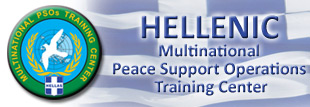 |  |
On May 7th 2012 one more Multinational UN Military Observers Course started as scheduled.
19 students out of 9 different nations (Algeria, Greece, United Arab Emirates, Romania, Turkey have responded with participation in this 3 weeks course.
During the course, students will attend 60 hours of academic classes, where issues relevant to UN Military Observers Course are addressed and explained in detail. Moreover, trainees will have the opportunity to carry out a UN Military Observers field exercise.
During their stay in Greece a tentative program with social events will follow, to allow trainees visit the famous Greek antiquities in the site of Vergina where King Phillip’s tomb (Alexander’s the Great father) is located and other sightseeing.
Next course to come is the 2 weeks Sea-Land Borders Security & Refugees/Arms/Dual-Use Goods Control Course scheduled to start on the 11th June 2012. Participation of famous national and international Guest Speakers and Instructors from various Institutions is expected.
Purpose of the Sea-Land Borders Security & Refugees/Arms/Dual-Use Goods Control Course:
To familiarize Officers, NCOs and Equivalent Civilians from different countries, with all aspects of Sea-Land Border and Refugees/Arms/Dual-Use Goods Control field.
To familiarize trainees with organizing, manning, equipping and running Border Control Units and Sectors. Additionally to enhance information sharing between the aforementioned stakeholders at the national and regional level in order to effectively enhance the border security and fight the trafficking of human beings, conventional weapons (including small arms and light weapons) and strategic dual-use commodities across the borders.
Learning Objectives of the Sea-Land Borders Security & Refugees/Arms/Dual-Use Goods Control Course:
Through general orientations, one week theory and a one week practice with syndicate work and scenario based field exercise, the students will receive:
- Legal Considerations.
- ROE and Use of Force.
- Humanitarian Codes of Conduct.
- Human Rights.
- Refugees Rights.
- Border Control Systems organization, manning and equipment.
- Basic duties, responsibilities and techniques, such as vehicle and personnel
searching and checking techniques, control of Illegal arms, human trafficking etc.
- Verification of Travel Documents.
- Hygiene Measures.
- Use of Drug/Bomb Dogs.
- Coast Guard Duties, Procedures and Sea Training.
- IOs - NGOs related with Refugees Handling.
- The UNHCR Example.
- Internal Conflict and Displacement.
- Field Training on Border Control Duties.
Except of the above mentioned objectives there is always the possibility in offering of certain topics within modules. Some examples of these themes include:
- The OSCE core documents such as the Border Security Management Concept etc
- Regional Border Security and Management – Mechanisms for Coordination and Cooperation
- Implementation of National Border Strategies
- Border Crossing Points
- Customs Controls for the Collection and Protection of Revenue
- Emerging Transnational Threats
- Law Enforcement Integration
- Combating Drug and Human Trafficking
- De-mining
- Hazardous Commodities: The Basel Convention
- Migration and Refugees
- Human Rights and the Borders Management
- Concepts of Operations
- Public Affairs and Media Matters
Slots are still available, so nations that may have an interest in this course send your join report ASAP.














 Login
Login Forgotten password
Forgotten password